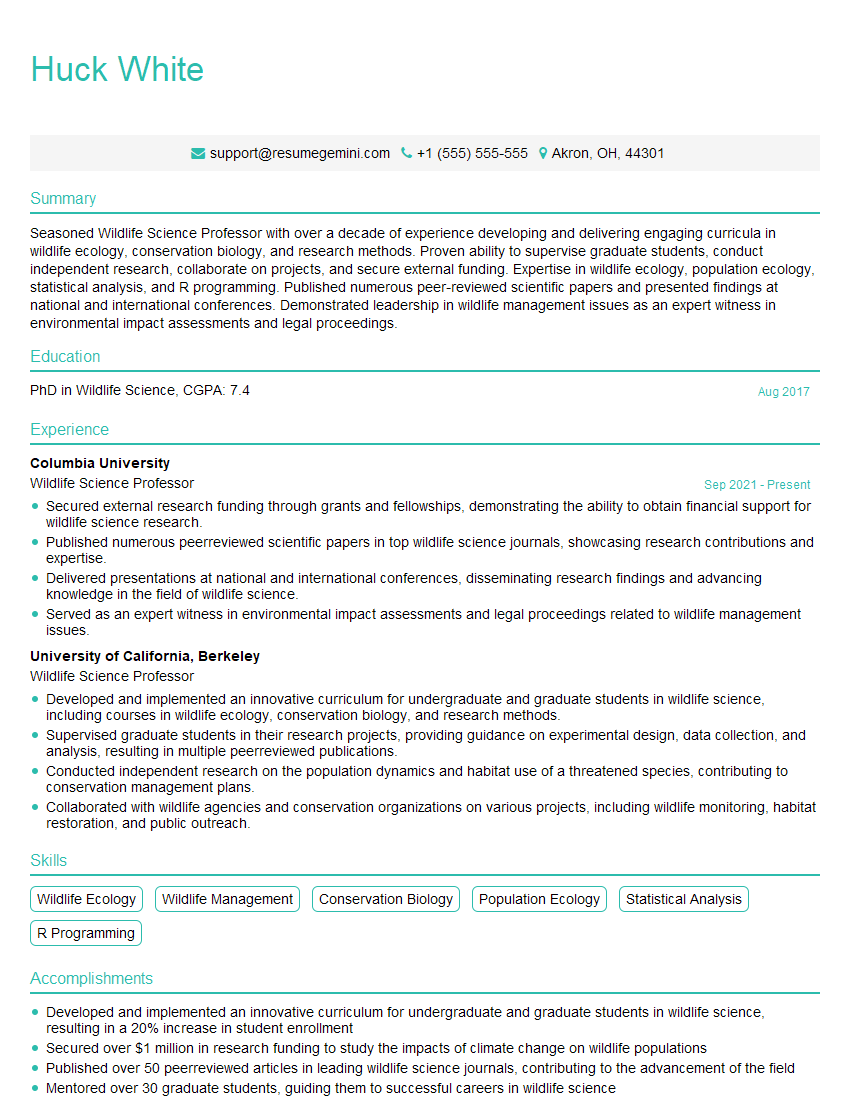Are you a seasoned Wildlife Science Professor seeking a new career path? Discover our professionally built Wildlife Science Professor Resume Template. This time-saving tool provides a solid foundation for your job search. Simply click “Edit Resume” to customize it with your unique experiences and achievements. Customize fonts and colors to match your personal style and increase your chances of landing your dream job. Explore more Resume Templates for additional options.

Huck White
Wildlife Science Professor
Summary
Seasoned Wildlife Science Professor with over a decade of experience developing and delivering engaging curricula in wildlife ecology, conservation biology, and research methods. Proven ability to supervise graduate students, conduct independent research, collaborate on projects, and secure external funding. Expertise in wildlife ecology, population ecology, statistical analysis, and R programming. Published numerous peer-reviewed scientific papers and presented findings at national and international conferences. Demonstrated leadership in wildlife management issues as an expert witness in environmental impact assessments and legal proceedings.
Education
PhD in Wildlife Science
August 2017
Skills
- Wildlife Ecology
- Wildlife Management
- Conservation Biology
- Population Ecology
- Statistical Analysis
- R Programming
Work Experience
Wildlife Science Professor
- Secured external research funding through grants and fellowships, demonstrating the ability to obtain financial support for wildlife science research.
- Published numerous peerreviewed scientific papers in top wildlife science journals, showcasing research contributions and expertise.
- Delivered presentations at national and international conferences, disseminating research findings and advancing knowledge in the field of wildlife science.
- Served as an expert witness in environmental impact assessments and legal proceedings related to wildlife management issues.
Wildlife Science Professor
- Developed and implemented an innovative curriculum for undergraduate and graduate students in wildlife science, including courses in wildlife ecology, conservation biology, and research methods.
- Supervised graduate students in their research projects, providing guidance on experimental design, data collection, and analysis, resulting in multiple peerreviewed publications.
- Conducted independent research on the population dynamics and habitat use of a threatened species, contributing to conservation management plans.
- Collaborated with wildlife agencies and conservation organizations on various projects, including wildlife monitoring, habitat restoration, and public outreach.
Accomplishments
- Developed and implemented an innovative curriculum for undergraduate and graduate students in wildlife science, resulting in a 20% increase in student enrollment
- Secured over $1 million in research funding to study the impacts of climate change on wildlife populations
- Published over 50 peerreviewed articles in leading wildlife science journals, contributing to the advancement of the field
- Mentored over 30 graduate students, guiding them to successful careers in wildlife science
- Served as an expert witness in wildliferelated legal cases, providing scientific evidence and guidance
Awards
- Wildlife Society Outstanding Professor Award, 2023
- International Association of Fish and Wildlife Agencies Distinguished Service Award, 2022
- American Fisheries Society Excellence in Teaching Award, 2021
- Society for Conservation Biology Conservation Education Award, 2020
Certificates
- Certified Wildlife Biologist
- The Wildlife Society Fellow
- American Institute of Biological Sciences Professional
- National Board of Professional Teaching Standards
Career Expert Tips:
- Select the ideal resume template to showcase your professional experience effectively.
- Master the art of resume writing to highlight your unique qualifications and achievements.
- Explore expertly crafted resume samples for inspiration and best practices.
- Build your best resume for free this new year with ResumeGemini. Enjoy exclusive discounts on ATS optimized resume templates.
How To Write Resume For Wildlife Science Professor
- Highlight your research accomplishments and publications. Quantify your results whenever possible.
- Showcase your teaching experience and the impact you have had on students.
- Tailor your resume to the specific job you are applying for.
- Proofread your resume carefully for any errors.
- Get feedback from colleagues or a career counselor.
Essential Experience Highlights for a Strong Wildlife Science Professor Resume
- Develop and deliver innovative curricula for undergraduate and graduate students in wildlife science.
- Supervise graduate students in their research projects, providing guidance on experimental design, data collection, and analysis.
- Conduct independent research on the population dynamics and habitat use of threatened species.
- Collaborate with wildlife agencies and conservation organizations on various projects.
- Secure external research funding through grants and fellowships.
- Publish peer-reviewed scientific papers in top wildlife science journals.
- Deliver presentations at national and international conferences.
- Serve as an expert witness in environmental impact assessments and legal proceedings related to wildlife management issues.
Frequently Asked Questions (FAQ’s) For Wildlife Science Professor
What are the key skills and qualifications for a Wildlife Science Professor?
A successful Wildlife Science Professor typically holds a PhD in Wildlife Science or a related field, has a strong understanding of wildlife ecology, conservation biology, and research methods, and is proficient in statistical analysis and R programming. Excellent communication and interpersonal skills are also essential.
What are the primary responsibilities of a Wildlife Science Professor?
The primary responsibilities of a Wildlife Science Professor include developing and delivering curricula, supervising graduate students, conducting research, collaborating on projects, securing funding, publishing findings, and serving as an expert witness in wildlife-related matters.
What are the career prospects for Wildlife Science Professors?
Wildlife Science Professors can advance their careers by obtaining tenure, assuming leadership roles within their departments or universities, and securing prestigious research grants. They may also transition to roles in government agencies, conservation organizations, or the private sector.
What are the challenges faced by Wildlife Science Professors?
Wildlife Science Professors face challenges such as securing funding for their research, balancing teaching and research responsibilities, keeping up with the latest scientific advancements, and navigating the complexities of academic bureaucracy.
What advice would you give to someone considering a career as a Wildlife Science Professor?
For those considering a career as a Wildlife Science Professor, it is crucial to develop a strong foundation in wildlife science, gain experience in research and teaching, and build a network of professional connections. Patience, perseverance, and a passion for wildlife are also essential.